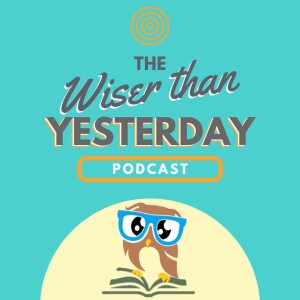
Wiser Than Yesterday: Book club
Arts:Books

Why we sleepWritten by Matthew WalkerAmazing breakthrough - science has discovered a new treatmentLive longerEnhances memoryMore creativeLook more attractiveMakes slimLowers food cravingsProtects cancer and dementiaWards off colds and the fluLowers risk of heart attacks and stroke and diabetesYoull even feel happier, less depressed and less anxiousNeglecting sleep undercuts your creativity, problem solving, decision-making, learning, memory, heart health, brain health, mental health, emotional well-being, immune system, and even your life span. Why do we sleep? After all, when you’re sleeping—and all animals do—you can’t hunt, gather, eat, reproduce, or defend yourself. Yet Walker concludes that the evolutionary upsides of sleep are far greater than these downsides. In brief, sleep produces complex neurochemical baths that improve our brains in various ways. And it “restocks the armory of our immune system, helping fight malignancy, preventing infection, and warding off all manner of sickness.” In other words, sleep greatly enhances our evolutionary fitness—just in ways we can’t see.What influences sleep qualityCoffeeAlcohol alcohol is one of the most powerful suppressors of REM [rapid-eye-movement] sleepLightTemperatureRegular sleep and wake timeWakaing up forced =bad for heart, snoozing extra badSleeping pills no real sleepTipsAvoid blue light at nightGo to bed only when sleepyDont lie awake, go do somethimg relaxingReducing sleep amxiety by limiting time in bedCircadian rythmA natural, internal process that regulates the sleep–wake cycle and repeats roughly every 24 hours. It can refer to any process that originates within an organism (is endogenous) and responds to the environment. of teens is shifted forward, there are also differences in people. 40% of ppl are morning persons, 30% night owlsSmart heating and lighting will help circadian rythmSleep enough in the week before your flu shotIf you can possibly take a short midday nap like our ancestors used to and some Mediterranean and South American cultures still do, you should (but no later than 3 pm). It will likely improve your creativity and coronary health as well as extend your lifetime.Accidents caused by drowsy driving are more dangerous than those caused by intoxication12 tips for a healthy sleep1 Stick to a sleep schedule (set an alarm for bedtime)2 Excercise is great, but not within 2-3 hours before sleep time3 Avoid caffeine and nicotine4 Avoid alcohol before bed5 Avoid large meals and beverages late6 Avoid medicines that influence sleep7 Dont take naps after 3 PM8 Relax before bed9 Take a hot bath before bed10 Dark, cool, gadget-free bedroom11 Have sunlight exposure (or fake in morning)12 Dont lie awake
view more
Don't Forget to leave a comment on this episode
See podvine.com/privacy-policy for podcast listener privacy info.
Hosted on Acast. See acast.com/privacy for more information.
More Episodes
Business: Hooked - Nir Eyal
 2021-04-27
2021-04-27
 2021-04-27
2021-04-27
Business: Obviously Awesome - April Dunford
 2021-04-21
2021-04-21
 2021-04-21
2021-04-21
Business: The High Growth Handbook
 2021-04-14
2021-04-14
 2021-04-14
2021-04-14
Business: The Messy Middle - Scott Belsky
 2021-04-07
2021-04-07
 2021-04-07
2021-04-07
Business: The Lean Startup - Eric Ries
 2021-03-12
2021-03-12
 2021-03-12
2021-03-12
The best books of 2020
 2021-02-03
2021-02-03
 2021-02-03
2021-02-03
Meditations - Marcus Aurelius
 2021-01-23
2021-01-23
 2021-01-23
2021-01-23
Seneca - On the Shortness of Life
 2020-12-26
2020-12-26
 2020-12-26
2020-12-26
The Republic - Plato
 2020-11-20
2020-11-20
 2020-11-20
2020-11-20
Epicurus
 2020-11-16
2020-11-16
 2020-11-16
2020-11-16
Enchiridion by Epictetus
 2020-10-19
2020-10-19
 2020-10-19
2020-10-19
The Confessions by Saint Augustine of Hippo
 2020-10-12
2020-10-12
 2020-10-12
2020-10-12
The final days of Socrates - Plato
 2020-09-25
2020-09-25
 2020-09-25
2020-09-25
Season Recap: Racism and Inequality
 2020-09-19
2020-09-19
 2020-09-19
2020-09-19
How to be an antiracist - Ibram X. Kendi
 2020-08-10
2020-08-10
 2020-08-10
2020-08-10
White fragility - Robin DiAngelo
 2020-08-05
2020-08-05
 2020-08-05
2020-08-05
012345678910111213141516171819
Create your
podcast in
minutes
- Full-featured podcast site
- Unlimited storage and bandwidth
- Comprehensive podcast stats
- Distribute to Apple Podcasts, Spotify, and more
- Make money with your podcast
It is Free
- Privacy Policy
- Cookie Policy
- Terms of Use
- Consent Preferences
- Copyright © 2015-2024 Podbean.com





